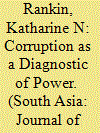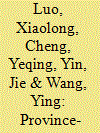| Srl | Item |
| 1 |
ID:
168823


|
|
|
|
|
| Summary/Abstract |
In this article, we bring ethnographic insights from the contemporary moment of social and political transformation in Nepal to bear on troubling established understandings of corruption. We argue that corruption furnishes a productive site from which to interpret the relational space of state practice and to probe the ‘blurred boundaries’ of states, polities and markets in everyday lives. Reading corruption as a ‘diagnostic of power’, moreover, can help reveal intersecting and competing structures of power at work in ongoing processes of state construction and contestation. The argument is developed through an examination of three related and overlapping illustrations of public–private transgression, which we characterise as ‘impossible publics’, ‘consensus collusion’ and ‘patronage democracy’. Taken together, they speak to the diversity of practices commonly glossed as corruption, and their embeddedness in powerful mobilisations of affective communion and intimate relations of mutual obligation. We suggest in conclusion that engaging corruption as a diagnostic of power offers critical insights about the nature of, and possibilities for, distribution, political agency and planning. Overall, we make a case for the importance of disaggregating diverse practices of corruption in specific, socially embedded contexts in order to reveal possibilities for the meaningful redistribution of political power and opportunity.
|
|
|
|
|
|
|
|
|
|
|
|
|
|
|
|
| 2 |
ID:
129099


|
|
|
|
|
| Publication |
2014.
|
| Summary/Abstract |
Scalar relations have been restructured in the contemporary capitalism. in post-reform China. many scalars are transformed and constructed with the transition from state socialism to market economy. This article examines the process of rescaling state power from the perspective of politics of scale. using a case of province-jading-city reform in Jiangsu province. By examining the role of government at various levels in the province-leading-city reform. it is argued that the province-leading-city reform is a rescaling of state power. involving up-scaling and down-scaling of powers. Due to power reshuffling in the rescaling process. there are intense power struggles among scalars in both vertical and horizontal dimensions. With the deepening process of globalization. marketization. and decentralization. China's cities and regions have undergone dramatic economic and political restructuring since the late l970s. There emerges consider-
able acidotic and policy interests in China's changing urban and regional governance after the launch of economic reforms and open-door policy. especially after 2000.' On the urban scale. China's changing
governance has been the focus of previous studies? By cautiously borrowing Western urban theories. such as urban regime. growth coalition. and entrepreneurial city. scholars have argued that transitional China shares stone similarities with Western societies, but there are still differences in urban governance due to a strong government or tight social control."
|
|
|
|
|
|
|
|
|
|
|
|
|
|
|
|